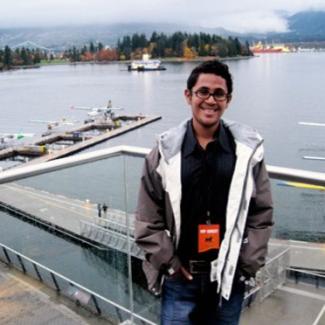
Thirty-year-old Imran, born with Thalassaemia Major, does not see himself as a tragic victim at the mercy of his illness, but leads a high-spirited life with friends, food and music and a job at a leading software firm in Mumbai.
My name is Imran Mohammad Ali. I was born with Thalassaemia Major, an inherited blood disorder which causes the body to produce abnormal haemoglobin red blood cells. I need to get blood transfusion regularly to keep me healthy and alive.
I was born in 1985, a happy, lively, normal child. It was after my first birthday that signs of Thalassaemia started manifesting. I began losing my appetite initially. In a month, my intake was reduced to nearly half of what other kids of my age would consume. My weight came down drastically, and I turned thin and pale. When all efforts to ensure I ate well failed, I was taken to a doctor. Several bottles of tonics were handed over to my mother, but they had no effect on me. I continued to lose weight and started looking severely anaemic.
Finally, I was taken to a hospital where tests revealed that I had Thalassaemia Major. My family was shocked naturally. It was my mother who bore the trauma the most strongly. I was immediately advised blood transfusion, if I had to survive. My mother held me tightly close to her right through my blood transfusion till the needle was jabbed in me for 3-4 hours.
This became a monthly affair for us. My mother and I would go to the hospital and she would sit holding me, till my entire blood transfusion was over. Sometimes, they would use the leg vein for blood transfusion, because my hand would pain and swell.
My life continued. I was sent to school and began leading a near normal life. I was a bright student and did well in academics. I would participate actively in drama, debates and elocution. I was not an enthusiastic sports person, as I would tire easily and that was a major hindrance. Fortunately, I did not face much discrimination in school. I had a good circle of friends.
I was one-and-a-half-year-old when I got my first blood transfusion. Since then it has become a part-and-parcel of my existence. Initially, blood transfusion was required once a month. But with age, the frequency has increased. Now, I need to get blood transfusion every 10 days.
As a patient of Thalassaemia, we have to be extremely careful about iron overload that occurs from blood transfusion. Iron overload is when you have too much iron in the body. It can damage the liver, heart and can cause premature death. To balance the iron overload, I need to take tablets and injections daily. Excess iron in the blood also affects growth. I have a short stature. My height is only 5 feet.
I have large network of friends who are extremely supportive and considerate. In fact, some of them have donated blood for me. I also hang out with a few Thalassaemic friends. We have formed a Thalassaemic alliance group. Together, we organize seminars and talks for younger Thalassaemic kids. We find that many of them are not enthused about life, they are listless and dispirited. We speak to them to boost their morale and keep them going.
My biggest regret in life in that I could not pursue cricket as a profession. I am a huge fan of Sachin Tendulkar and crazy about cricket. But being Thalassaemic, I could not undertake the rigour.
Otherwise, I lead quite a regular life. I listen to rap music, particularly American rapper Eminem. I follow him closely and know all his tracks. I also love eating. My friends and I often go out to restaurants. There is no restriction on my diet. I just have to avoid too much spice and red meat. I don’t have alcohol as I was diagnosed with hepatitis C eight years ago. As you know, Thalassaemia is passed on from parents to child. If both parents carry Thalassaemia minor, their children may have Thalassaemia minor, or they may have completely normal blood, or they may have Thalassaemia major. Like my younger sister does not have Thalassaemia.
Despite efforts by social activists there is still lack of awareness about Thalassaemia in India. Every individual should be counselled before marriage and should get a medical examination done compulsorily so that their children are guaranteed good health.
I would advice other Thalassaemic people to lead a normal, regular life, not to take the disease too seriously. If you do not keep thinking about your problem, then your mind will be preoccupied with something else which could provide the much-needed diversion and solace.
Only then can you go far!






